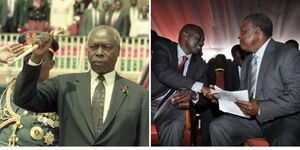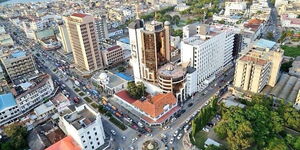As the end of the year approaches, bringing an end to the 2010/2019 decade, Kenya is sure to reflect on some of the major events that impacted the country over the ten years.
A recount on the magnitude of national events, a majority of them, political, establishes their significance and contribution to the stability, unity, and development of this great nation.
The Promulgation of the Constitution
Since 1963, the country has changed the laws of the land three times.
After it was presented to the attorney general in April and the final draft documented in May 2010, it was promulgated on August 27, after a successful referendum, in which 67 per cent of Kenyans voted for it.
The constitution brought about a change in the structure of government, from a federal, or majimbo system, to a unitary system. The redraft created a bicameral instead of a unicameral Legislature.
A number of laws were scrapped, including the minimum age limit of 35 for any person intending to vie for the presidency.
The 2010 constitution came with a number of reforms affecting Kenyans regarding the Judiciary, governance, elections, human rights and socio-economic issues.
The most notable was the introduction of devolution, which was aimed at decentralising the government to achieve better sharing of national resources.
At the time, even the world lauded Kenya for the constitutional reforms.
The then US Secretary of State Hillary Clinton stated, "I am pleased that they have taken this step, which represents a major milestone."
The 2013 General Election
Though the new constitution was promulgated in August 2010, the 2013 polls greatly represented the implementation of the new reforms.
President Uhuru Kenyatta and his deputy, William Ruto were elected on a single ticket and actualised the devolved system of governance.
Other than MPs and councillors (now MCAs), voters went to the ballot to elect governors, senators, and women representatives.
Kenyans were introduced to a new system of governance that promised to improve service delivery and bridge the gap between leaders and the people.
2007 PEV and Uhuru Kenyatta and William Ruto's ICC trials
President Uhuru Kenyatta and his deputy, William Ruto were allowed by the court to contest the 2013 General Election, despite pending cases at the International Criminal Court (ICC), against the two.
They had been charged for acts against humanity in the 2007 post-election violence, where many Kenyans lost their lives.
The skirmishes laid bare the fact that Kenya's elections have roots that run much deeper than the presidential poll.
The scale and speed of the violence shocked both Kenyans and the world at large. Two months of bloodshed left over 1,000 dead and up to 500,000 internally displaced.
On October 6, 2013, President Kenyatta handed over power to his deputy in a rather unexpected move that allowed him to attend his trial at the Hague as an ordinary individual, and not as head of state.
The transfer of power was achieved in a ceremony that was conducted at Parliament as per the law, and Uhuru later left without his presidential escort.
The September 1 Maraga Ruling
Chief Justice David Maraga on September 1, 2018, became the first judge to annul a presidential election in Africa. The Supreme Court justice cancelled President Kenyatta's win, citing electoral malpractice.
Maraga ruled that the August 8 election had not been "conducted in accordance with the constitution" and therefore, declared it "invalid, null and void".
His decision to have a repeat of the election sent a strong message across the continent, setting an example for the conduct of future electoral proceedings.
The March 9, 2018, handshake
In 2017, a rather unpleasant stint of chaos followed the repeat presidential poll, after NASA called for demonstrations.
The resistance by the opposition turned ugly after a number of deaths were reported across the country.
On January 31, 2018, NASA principal Raila Odinga was sworn in as the people's president fuelling tension in the country.
On March 9, 2018, Odinga and Kenyatta agreed to solve their differences and work together in uniting the nation.
This marked the end of the long resistance period by the opposition. To further ensure the development of the country, the duo reached an agreement to form a committee to spearhead the reforms needed to develop the country, which was referred to as the Building Bridges Initiative.












